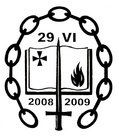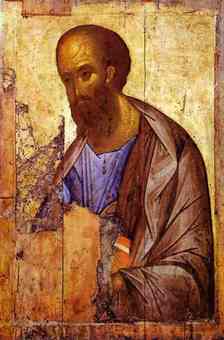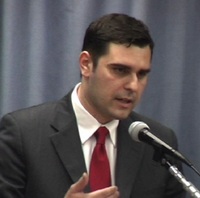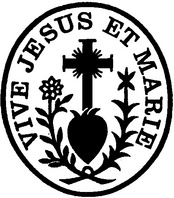How often do you think mainline Christians take the personal piety of others? How frequently do we take someone who says “I am spiritual but not religious”? “Not very often” is the best answer to offer. Saying that one is spiritual and not religious lacks a certain seriousness of belief and unbelief. Catholics in the USA number circa 65-70 million and in the world Catholics number just over a billion this notion of being spiritual and not religious gaining currency. Why? Because a personal relationship with Jesus is lacking. There is no encounter with the living Messiah, Jesus is an abstraction.
Tag: New Evangelization
Julián Carrón speaks on the New Evagelization, relationship between the Gospel and culture
On October 14, 2011 Pope Benedict XVI received Father Julián Carrón, President of the Fraternity of Communion and Liberation, in audience in the Apostolic Palace, the day before the Vatican meeting on “New Evangelizers for a New Evangelization,” a two day event that will culminate in the Mass with the Pope on Sunday at 9:30 in Saint Peter’s Square. What follows is an interview with Vatican Radio’s Alessandro Gisotti (emphasis mine).
Alessandro Gisotti interviewed Fr. Carrón about tomorrow’s meeting and the challenge of the new evangelization.
Father Julián Carrón: The first thing I would like to express is how grateful and moved I am at this opportunity the Holy Father has given me to be with him in this audience, because it enabled me to tell him how, in this moment of travail due to the social, cultural, and economic situation, we are seeing that when people verify the faith in their own life circumstances, they flower into a type of person that leaves us speechless. Being able to share with him living the faith, as he testifies it to us, was a true consolation.
How important is this meeting? How important is the Pope’s challenge for a new evangelization?
Bocelli, Messori & Mother Veronica Berzosa support the New Evangelization
Since the found of the Pontifical Council for the New Evangelization with Archbishop Rino Fisichella as its president, all eyes looked to today’s event in the Pope Paul VI Auditorium with nearly eight thousand people from every continent gathered in Rome to experience what it means to share the Faith of Jesus Christ with others through word and music. Pope Benedict attended part of the gathering and said, “The world today needs people who proclaim and witness that Christ is the one who teaches us the art of living, the way of true happiness, because He himself is the way of life.”
Archbishop Fisichella invited Mother Veronica Berzosa, founder of Iesu Communio, a religious community of women dedicated to the evangelization of the youth, Italian writer Vittorio Messori who spoke about the reasons to believe, and the Italian scientist Marco Bersanelli who spoke on about the dialogue between science and faith. Colombian bishop Fabio Suescun, spoke to those assembled on experiences of the New Evangelization in Latin America.
For many, it was beautiful to hear Andrea Bocelli who said:
“I think I owe my faith to an internal search, the rejection of the idea of feeling like I was the product of coincidence. I followed my road, I hope to do so consistently, even when certain episodes of life make us tremble and feel weak before our convictions.”
The New Evangelization: Locating the keys
Carindal Stanisław Ryłko, 66, President of the Pontifical Council for the Laity, wrote a brief editorial on the contours of the new evangelization. In 2012, there will be another Synod of Bishops’ meeting with the new evangelization as it’s central topic. He’s helping to focus our attention on the exhortation of Jesus to spread the Kingdom of God. A mere two paragraphs follow, but you can read the entire editorial here.
As is known, the idea is not new: the entire pontificate of Blessed John Paul II was characterized by the leit-motiv of the new evangelization. Pope John Paul II did not fail to explain to us what he intended when he placed the adjective “new” in front of the traditional term, “evangelization”: new in ardor, new in methods, new in expressions. For an appropriate and faithful understanding of the contents of the Lineamenta, one needs to have an adequate key for reading the text. The expression, “new evangelization,” in fact, has become so common – even abused – that we run the risk of distorting its sense, or worse, reducing it to an insignificant slogan. The heart of the question of the new evangelization, writes the Cardinal, is the centrality of God in our lives.
Cardinal Burke on the truth of human sexuality & fall of Christian culture
Raymond Cardinal
Burke, Prefect of the Supreme Tribunal of the Apostolic Signature, has been traveling lately. Most recently to Australia. There he spoke on the theme of “The Fall of the Christian West,” at a
symposium organized by the Australian Catholic Students Association, Sydney. He gave “particular attention to the witness to the truth regarding human sexuality, as fundamental to holiness of life, and to the question of conscience as the irreplaceable and secure guide in the pursuit of holiness of life.” The cardinal also reflected on martyrdom.
Among
many things said in the address the Cardinal said:
- quoting Benedict XVI said, we “need to form our consciences, in accord with the moral teaching of the Church … ‘our responsibility to make these criteria [these moral foundations] audible and intelligible once more for people today as paths of true humanity, in the context of our paramount concern for mankind'”
- “…our call to build anew a
strong Catholic culture, in fidelity to our vocation to give witness to Christ
and, therefore, to be martyrs for the faith” - “witness to the truth regarding
human sexuality, as fundamental to holiness of life, and to the question of
conscience as the irreplaceable and secure guide in the pursuit of holiness of
life.” - “The life of the martyr for the faith finds its center and source in the
Eucharistic sacrifice, in Eucharistic adoration, and in all forms of
Eucharistic devotion, especially visits to the Blessed Sacrament and spiritual
communion throughout the day” - “The Holy Eucharist not only strengthens us
spiritually to be true martyrs, but is the model of our martyrdom, pure and
selfless love, without condition, to the end.”
Papal document establishing Office of the New Evangelization: Ubicumque et Semper (Everywhere and always)
Apostolic Letter in the Form of Motu Proprio
Ubicumque et Semper
It is the duty of the Church to proclaim always and everywhere the Gospel of Jesus Christ. He, the first and supreme evangelizer, commanded the Apostles on the day of his Ascension to the Father: “Go therefore and make disciples of all nations, baptizing them in the name of the Father and of the Son and of the Holy Spirit, teaching them to observe all that I have commanded you” (Mt 28:19-20). Faithful to this mandate, the Church–a people chosen by God to declare his wonderful deeds (cf. 1 Peter 2:9)–ever since she received the gift of the Holy Spirit on the day of Pentecost (cf. Acts 2:14), has never tired of making known to the whole world the beauty of the Gospel as she preaches Jesus Christ, true God and true man, the same “yesterday and today and for ever” (Heb 13:8), who, by his death and Resurrection, brought us salvation and fulfilled the promise made of old. Hence the mission of evangelization, a continuation of the work desired by the Lord Jesus, is necessary for the Church: it cannot be overlooked; it is an expression of her very nature.
A new Vatican office: Pontifical Council for the New Evangelization?
Writing for il Giornale.it today, veteran vaticanista Andrea Tornielli, speaks of a new pontifical council to be created specifically for the work of the new evangelization, a term coined by Pope John Paul II in 1979 while visiting the Poland’s Nowa Huta. Pope Benedict is expected to release an Apostolic Letter soon. The idea comes to fruition because of the diligence of Venice’s cardinal-archbishop, Angelo Scola, and Josef Cordes and the inspiration of Monsignor Luigi Giussani, founder of the Fraternity of Communion and Liberation. A new council with this work is seen as keenly central to the work of Benedict’s papacy. The first head of the new council is expected to be according to Tornielli, Archbishop Rino Fisichella, the current head of the Pontifical Academy of Life and the rector of the Lateran University.
Saint John Eudes: a guide for ecclesial renewal who said give self to Christ
Yesterday’s general audience (August 19, 2009) Pope Benedict took the opportunity to draw our attention to the saint being memorialized in the Liturgy, Saint John Eudes, as a model for personal renewal which will lead to the renewal of the priesthood. The zeal, the desire for the face of God, the need for conversion will lead, I am convinced, not only the renewal of the priesthood (and seminarians) but also the entire Church. Christ is the one thing we are seeking, the one person we are seeking. As the Baptist said, “He must increase; I must decrease.” AND focus on CHRIST!!!!!
Read a portion of the Pope’s address.
While contempt was being spread for the Christian faith by some currents of thought that were prevalent then, the Holy Spirit inspired a fervent spiritual renewal, with prominent personalities such as that of Berulle, St. Vincent de Paul, St. Louis Mary Grignion de Montfort and St. John Eudes. This great “French school” of holiness also had St. John Mary Vianney among its fruits. By a mysterious design of Providence, my venerated predecessor, Pius XI, proclaimed John Eudes and the Curé d’Ars saints at the same time, on May 31, 1925, offering the Church and the whole world two extraordinary examples of priestly holiness.
In the context of the Year for Priests, I wish to pause to underline the apostolic zeal of St. John Eudes, directed in particular to the formation of the diocesan clergy.
The saints have verified, in the experience of life, the truth of the Gospel; in this way, they introduce us into the knowledge and understanding of the Gospel. In 1563, the Council of Trent issued norms for the establishment of diocesan seminaries and for the formation of priests, as the council was aware that the whole crisis of the Reformation was also conditioned by the insufficient formation of priests, who were not adequately prepared intellectually and spiritually, in their heart and soul, for the priesthood.
This occurred in 1563 but, given that the application and implementation of the norms took time, both in Germany as well as in France, St. John Eudes saw the consequences of this problem. Moved by the lucid awareness of the great need of spiritual help that souls were feeling precisely because of the incapacity of a great part of the clergy, the saint, who was a parish priest, instituted a congregation dedicated specifically to the formation of priests. He founded the first seminary in the university city of Caen, a highly appreciated endeavor, which was soon extended to other dioceses.
The path of holiness he followed and proposed to his disciples had as its foundation a solid confidence in the love that God revealed to humanity in the priestly Heart of Christ and the maternal Heart of Mary. In that time of cruelty and loss of interior silence, he addressed himself to the heart so as to leave in the heart a word from the Psalms very well interpreted by St. Augustine. He wanted to remind people, men and above all future priests of the heart, showing the priestly Heart of Christ and the maternal Heart of Mary. A priest must be a witness and apostle of this love of the Heart of Christ and of Mary.
Today we also feel the need for priests to witness the infinite mercy of God with a life totally “conquered” by Christ, and for them to learn this in the years of their formation in the seminaries. After the synod of 1990, Pope John Paul II issued the apostolic exhortation Pastores Dabo Vobis, in which he took up and actualized the norms of the Council of Trent and above all underlined the need for continuity between the initial and permanent moments of formation. For him, for us, this is a real point of departure for a genuine reform of priestly life and apostolate, and it is also the central point so that the “new evangelization” is not simply an attractive slogan, but rather is translated into reality.
The foundations of formation in the seminary constitute that irreplaceable “humus spirituale” in which it is possible to “learn Christ,” allowing oneself to be progressively configured to him, sole High Priest and Good Shepherd. The time in the seminary should be seen, therefore, as the actualization of the moment in which the Lord Jesus, after having called the Apostles and before sending them out to preach, asks that they stay with him (cf. Mark 3:14).
When St. Mark narrates the vocation of the Twelve Apostles, he tells us that Jesus had a double objective: The first was that they be with him, the second that they be sent to preach. But in going always with him, they truly proclaim Christ and take the reality of the Gospel to the world.
In this Year for Priests, I invite you to pray, dear brothers and sisters, for priests and for those preparing to receive the extraordinary gift of the priestly ministry. I conclude by addressing to all the exhortation of St. John Eudes, who said thus to priests: “Give yourselves to Jesus to enter into the immensity of his great Heart, which contains the Heart of his Holy Mother and of all the saints, and to lose yourselves in this abyss of love, of charity, of mercy, of humility, of purity, of patience, of submission and of holiness” (Coeur admirable, III, 2).
Work for sake of the Gospel
 This is the summary of the Pope Benedict’s catechesis on Saint Paul for Wednesday, 27 August 2008. Here is the full text of the catechesis as published on Zenit.
This is the summary of the Pope Benedict’s catechesis on Saint Paul for Wednesday, 27 August 2008. Here is the full text of the catechesis as published on Zenit.
Online resources for the Year of Saint Paul can be found at the Vatican website, the Basilica of Saint Paul Outside the Walls, the U.S. Bishops Committee on Divine Worship and from Our Sunday Visitor.
Pope said:
Today’s catechesis presents the life of Saint Paul, the great missionary whom the Church
 honours in a special way this year. Born a Jew in Tarsus, he received the Hebrew name “Saul” and was trained as a “tent maker” (cf. Acts 18:3). Around the age of twelve he departed for Jerusalem to begin instruction in the strict Pharisaic tradition which instilled in him a great zeal for the Mosaic Law. On the basis of this training Paul viewed the Christian movement as a threat to orthodox Judaism. He thus fiercely “persecuted the Church of God” (1 Cor 19:6; Gal 1:13; Phil 3:6) until a dramatic encounter on the road to Damascus radically changed his life. He subsequently undertook three missionary journeys, preaching Christ in Anatolia, Syria, Cilicia, Macedonia, Achaia, and throughout the Mediterranean. After his arrest and imprisonment in Jerusalem, Paul exercised his right as a Roman citizen to appeal his case to the Emperor. Though Luke makes no reference to Nero’s decision, he tells us that Paul spent two years under house arrest in Rome (cf. Acts 28:30), after which–according to tradition–he suffered a martyr’s death. Paul spared no energy and endured many trials in his “anxiety for all the churches” (2 Cor 11:28). Indeed, he wrote: “I do everything for the sake of the Gospel” (1 Cor 9:23). May we strive to emulate him by doing the same.
honours in a special way this year. Born a Jew in Tarsus, he received the Hebrew name “Saul” and was trained as a “tent maker” (cf. Acts 18:3). Around the age of twelve he departed for Jerusalem to begin instruction in the strict Pharisaic tradition which instilled in him a great zeal for the Mosaic Law. On the basis of this training Paul viewed the Christian movement as a threat to orthodox Judaism. He thus fiercely “persecuted the Church of God” (1 Cor 19:6; Gal 1:13; Phil 3:6) until a dramatic encounter on the road to Damascus radically changed his life. He subsequently undertook three missionary journeys, preaching Christ in Anatolia, Syria, Cilicia, Macedonia, Achaia, and throughout the Mediterranean. After his arrest and imprisonment in Jerusalem, Paul exercised his right as a Roman citizen to appeal his case to the Emperor. Though Luke makes no reference to Nero’s decision, he tells us that Paul spent two years under house arrest in Rome (cf. Acts 28:30), after which–according to tradition–he suffered a martyr’s death. Paul spared no energy and endured many trials in his “anxiety for all the churches” (2 Cor 11:28). Indeed, he wrote: “I do everything for the sake of the Gospel” (1 Cor 9:23). May we strive to emulate him by doing the same.

